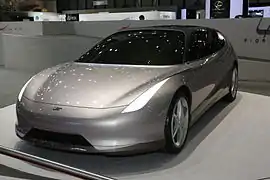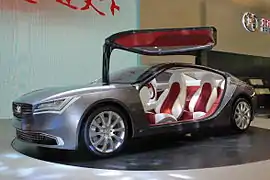Fioravanti (automotive)
Fioravanti is an Italian automotive design studio in Moncalieri outside the city of Turin. The company began in 1987 as an architectural practice working on projects in Japan, and since 1991, it has focused its activities on automotive design.
 | |
| Type | Società a responsabilità limitata |
|---|---|
| Industry | Design |
| Founded | Turin, Italy 1987 |
| Founder | Leonardo Fioravanti |
| Headquarters | , |
Area served | Worldwide |
| Services | Styling, Engineering, Pre-Series, Testing & Validation, Industrial Design |
| Website | fioravanti |
Fioravanti was founded by C.E.O. Leonardo Fioravanti, who worked twenty-four years with Pininfarina on such vehicles as the Ferrari Daytona, Dino road cars, Ferrari 512 Berlinetta Boxer, the Ferrari 308 GTB, Ferrari 288 GTO and the Ferrari F40.
In more recent times the company has continued with independent creations, such as in 2004 with the Fioravanti Kite and collaborations with well-known car manufacturers such as in 2008 when the Piedmontese body shop designed the Ferrari SP1 for Ferrari. This model, made as a one-off, was the first car to come from Ferrari's "Special Projects" division, a program by Ferrari to create one-of-a-kind cars in collaboration with the most famous names in Italian design, for private clients. In 2006 the Fioravanti Skill was presented, based on the Fiat Grande Punto.[1]
Cars styled by Fioravanti

Concept cars and one offs
- 1994 Fioravanti Sensiva
- 1996 Fioravanti Nyce
- 1996 Fioravanti Flair
- 1998 Fioravanti F100
- 2000 Fioravanti F100r
- 2000 Fioravanti Tris
- 2001 Alfa Romeo Vola
- 2002 Fioravanti YAK
- 2004 Fioravanti Kyte
- 2005 Fioravanti Kandahar
- 2006 Fioravanti Skill
- 2007 Fioravanti Thalia
- 2008 Fioravanti Hidra
- 2008 Ferrari SP1
- 2009 Fioravanti LF1
- 2013 BAIC Concept 900
 1994 Fioravanti Sensiva
1994 Fioravanti Sensiva 2000 Fioravanti F100r
2000 Fioravanti F100r 2001 Alfa Romeo Vola
2001 Alfa Romeo Vola 2004 Fioravanti Kite
2004 Fioravanti Kite 2008 Fioravanti Hidra
2008 Fioravanti Hidra 2013 BAIC Concept 900 at AutoShanghai 2013
2013 BAIC Concept 900 at AutoShanghai 2013
References
- "Ginevra: Fioravanti Skill". 2017-09-23. Archived from the original on 23 September 2017. Retrieved 2022-05-12.